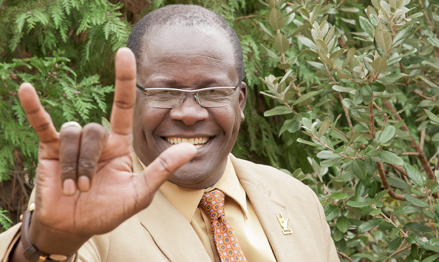Latest News Archive
Please select Category, Year, and then Month to display items
12 January 2024
|
Story Nonsindiswe Qwabe
|
Photo Sonia Small
 Since joining the UFS in 2008, Dr Grey Magaiza has worked extensively on approaches that can foster the socio-economic transformation of societies.
Since joining the UFS in 2008, Dr Grey Magaiza has worked extensively on approaches that can foster the socio-economic transformation of societies.
“The future should be one where communities can decide on their development agenda and futures. That’s the most important for me.” Dr Grey Magaiza, Deputy Director of the Centre for Gender and Africa Studies (CGAS) and Head of the Community Development programme on the Qwaqwa Campus, is passionate about capacitating communities to be agents of change and advancement. His vision for the future emphasises the empowerment of communities to take charge of their development by actively participating in decision making and the implementation of development projects that can improve their lives.
Since joining the UFS in 2008, Dr Magaiza has worked extensively on approaches that can foster the socio-economic transformation of societies. Over the years, he has crafted his research speciality into one that he is most proud of – being an interdisciplinary scientist immersed in the development of communities.
“I’m in a fortunate position of researching what I like. I say ‘fortunate’, because I’ve taken the time to understand what I’m passionate about, which is the overall field of rural livelihoods and livelihood futures – in short, community development. My research starts from an engaged university, understanding the elements that a university must use to enhance transformation and relevance to its immediate community in terms of development.”
One of the ways he has done this is by looking at social entrepreneurship as a development approach for young people in a rural setting. Through workshops with non-profit and civic organisations in Qwaqwa, Dr Magaiza has been helping these organisations to map out their needs and actively meet them through the involvement and support of external role players.
“We understand that communities are part of the national development agenda, but even that national agenda respects community knowledge and intentions and allows communities to shape their identity. A critical enabler of this is community organising. You bring back the capacity in communities to have dialogues on issues affecting them as spaces for engagement, knowledge exchange, and for people to just talk about their way forward.”
By enabling communities to define their development agenda, they can address their specific needs, challenges, and aspirations, he said. “When I look at livelihood futures, it’s quite an exciting aspect of my work – it’s like looking into a fortune tellers’ globe, because you’re not deciding for communities what they should do, but the communities themselves take those decisions.”
National accolade for Dr Philemon Akach
2013-10-21
|
 |
|
Dr Philemon Akach
Photo: Sonia Small
21 October 2013 |
Excellence in Teaching and Learning is highly regarded at the University of the Free State, with our academics recognised on national and international platform.
Earning yet another accolade for the university, Dr Philemon Akach, Head of the Department of South African Sign Language, has been awarded a National Excellence in Teaching and Learning Award. The award by the Higher Education Learning and Teaching Association of Southern Africa (HELTASA) and Council on Higher Education (CHE), recognised Dr Akach as a “leader in the field of teaching and learning – with impact beyond the classroom and the institution.” Recognising his pioneering work within deaf education, HELTASA and CHE commend Dr Akach as an “inspirational practitioner who recognises the inclusion of the marginalised in education.”
Dr Akach is one of five recipients, selected out of a total of 22 candidates from across South Africa that will receive the award. The other winners are from the University of Cape Town, Stellenbosch University, University of KwaZulu-Natal and the University of Pretoria. The five winners will receive the awards at a gala dinner at the annual HELTASA conference, which takes place from 26 to 29 November 2013.
Dr Akach, who will retire at the end of 2014, says the national recognition is the cherry on top as he prepares to return to his home country. Kenya. “How good can it be?” “This is my life calling,” he said about the 37 years he worked within deaf education.
The academic also received an Alumni Award for Outstanding Service at the recent Kovsie Alumni Awards.
Pioneering work by Dr Akach:
- With Dr Akach steering the process, the UFS became the first university on the continent to offer Sign Language as an academic course in 1999.
- Dr Akach was part of a nine-member task team that handed over the South African Sign Language (SASL) curriculum to the Minister of Basic Education, Angie Motshekga. A member of the ministerial task team since 2009, he helped to coordinate the development of the curriculum that will soon be offered as a school subject to Grade 0–12 learners in all 42 schools for the deaf in South Africa.